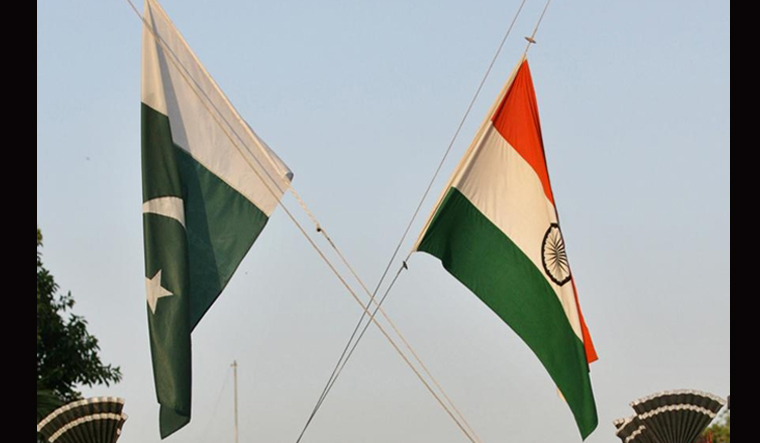
THE two nuclear powers of South Asia India and Pakistan are two hostile nations locked in a permanent enmity and extremely violent hatred of each other since the dawn of independence in 1947.
The hostile attitude demonstrated from both sides is based primarily based on the contentious issue of Kashmir the unfinished agenda of the partition of India by the colonial master Britain. The issue became more serious when in 2019 the Indian PM Modi unilaterally integrated it with the union of India.
This sudden and one sided political ambush by Modi was certainly against all canons of justice, fair play and also contrary to all the UN security council resolutions that require the future of Kashmir to be decided by the will of the people of the disputed territory and the consent of both India and Pakistan.
Throughout history relations between the two countries have been hostile and friction driven with a few periods of hope and peace but mostly sort of a permanent hostility with the fear of all-out war all the time.
This state of no war no peace has really consumed the resources of both countries because of the astronomical expense on defense and keeping a huge war machine in fear of each other. Both countries are steeped in poverty, illiteracy, disease and unemployment and need to spend more on social sector and eradication of poverty.
India and Pakistan are both firm and serious about their political stance on the Kashmir issue.
The Indian side steadfastly refuses to start a composite dialogue with Pakistan because they believe that Pakistan is guilty of cross border terrorism because of its support and help to Islamic militant groups. They accuse Pakistan of engaging in a proxy war by the use of militant outfits such as the Lashkar-i-Taiba, Jaish-i-Mohammed and many other Kashmiri militant groups.
Pakistan on the other hand has categorically denied all these accusations and in return blames India for imposing its one sided solution to the Kashmir problem and launching a reign of terror in the Indian occupied areas of Jammu and Kashmir.
While all this is going on it is completely forgotten that Kashmir is not only a territorial dispute but also involves the suffering of the Kashmiri people on both sides of the border.
Operation Gibraltar and the 1965 war did not achieve anything, the 1971 war was another bloody attempt that added to the misery of the Kashmiri people and the Kargil war was another tactical blunder, strategic mistake and a political disaster.
So far the Kashmir conflict has taken thousands of lives and many thousands more seriously injured in cross border firings and by land mines all along the Line of control.
Since the rule of the BJP led by Modi India the biggest secular democracy in the world has lost all claims to being a secular nation. Hard liner Hindu fundamentalists are now using religion for the promotion of their political agenda.
India is fast turning into a Hindu nationalist country resulting in undue misery for religious minorities special the Muslims of India. India and Pakistan have made tentative attempts to engage in back door diplomacy many times in the past but no major breakthrough has ever been achieved.
Apart from Kashmir relationship between the two neighbors has been hostile because of Siachin, Sir Creek Indus water treaty and Afghanistan.
This dangerous hostility and rivalry between the two neighbors is very complex and convoluted. The recent ongoing friction between the USA and China has force the US to get closer to India, on the other hand Pakistan is much closer to China and now implementing the Chinese initiative called the China Pakistan Economic Corridor.
This project is viewed with suspicion and fear by the Indian leadership and this has developed into another factor for the divisions between India and Pakistan.
The strategic alliance of Pakistan and China has further widened the chasm between the two countries. India has very successfully managed to get some countries of South Asia to side with them in the ongoing confrontation with Pakistan.
Ironically many Muslim countries of the Middle East have sided with India for their own benefits like trade and commerce.
India has patronized dissident groups like the Baloch Liberation Army and Pakistan has lent support to Nagaland and some other dissident groups up in arms against the Indian forces.
Pakistan created an entire fearsome Jihadi infrastructure to fight the Russian occupation forces in Afghanistan with the help of the USA and Saudi Arabia.
The legacy of the Afghan war resulted in the influx of millions of Afghan refugees into Pakistan and the militant Islamic groups injected the Jihadi culture, extremism and bigotry in Pakistani religious seminaries and across the political landscape of Pakistan.
For both countries resumption of dialogue is the only way to find an honourable solution to this state of perpetual enmity and hatred. Any future armed conflict could escalate into a nuclear war in which there will be no winners both sides will lose.
Both sides should take concrete measures such as an agreement on Siachin and Sir Creek and Indus River water sharing. But without creating an enabling environment and specific changes on the ground it will not be feasible to make any headway.
—The writer is Professor of History, based in Islamabad.
Source: Published in Pak Observer


